
Critical Eye: Are knowledge management researchers really more unethical, or is there more to the story?
Critical Eye is a semi-regular feature where RealKM analyses and discusses the methodology and science behind claims made in publications.
In a recent Google Scholar search, a key finding in a conference paper1 caught my eye. The paper, titled “Promoting Ethics and Integrity in Management Academic Research: Retraction Initiative”, examines ethics and integrity issues in management research through the analysis of retracted articles between 2005 and 2016. The finding that attracted my interest is:
Interestingly, the analyzed results indicate that knowledge management has the highest number of retracted articles with plagiarism as the predominant ethical issues.
A total of 50 retracted articles were analysed in the study, spanning the fields of accounting, business ethics, supply chain management, knowledge management, project management, human resources management and quality management. Of the 50 articles, 36 had a knowledge management focus, far more than the numbers of articles in the other fields, as shown in Figure 1.
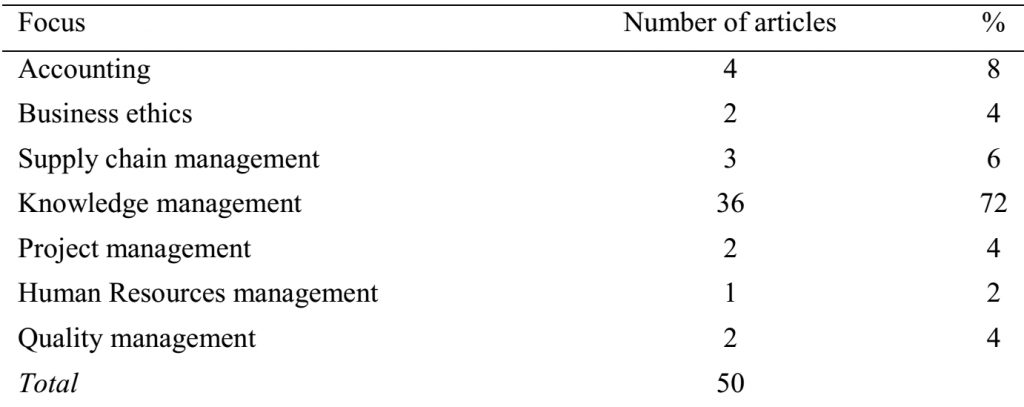
I was more than a little surprised by this finding, given that I’ve not previously encountered any indications of rampant unethical behaviour by knowledge management researchers in my extensive reading of knowledge management research, or in my exploration of matters related to the quality of academic publishing.
Is the number of knowledge management retractions really higher?
My first thought was to be dubious about the conference paper. Google Scholar has become increasingly filled with junk science, so papers located with a Google Scholar search need to be rigorously analyzed, including checking them against blacklists of predatory journals and publishers. Predatory conferences are also on the rise, and like predatory journals, many of these conferences lack rigorous peer review.
However, from an examination of the conference website, the event appears very legitimate, being an initiative of the Universiti Malaysia Pahang. The associated Journal of Governance and Integrity is also not listed as a predatory journal. Further, the conference paper was one of six papers to be awarded best paper at the conference.
Looking in detail at the study findings, an issue identified by the authors but not followed up is that nearly all of the retracted papers were published by just one publisher – the Institute of Electrical and Electronic Engineers (IEEE), which is based in New York.
After identifying this issue, I headed to the IEEE Xplore Digital Library website and entered “Notice of Retraction” into the search engine. As shown in Figure 2, a staggering 9,682 results were listed! To put this into perspective, a Retraction Watch article that I subsequently located said that as at 2015, Retraction Watch had covered some 2000 retractions in its five years of existence. IEEE, as just one publisher, lists five times as many retractions as Retraction Watch covered in five years!
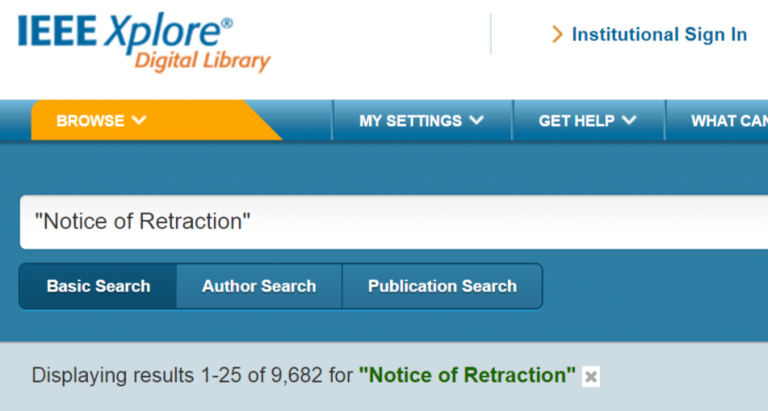
From this, it would appear that the searches conducted by the conference paper authors were not exhaustive. Further searches using the IEEE Xplore search engine also showed that while the number of knowledge management retractions is higher than for all of the other fields, it’s not far higher than two of the other fields – project management and accounting. The results of the searches were:
- 180 retraction notices for “Notice of Retraction” “accounting”
- 3 retraction notices for “Notice of Retraction” “business ethics”
- 128 retraction notices for “Notice of Retraction” “supply chain management”
- 242 retraction notices for “Notice of Retraction” “knowledge management”
- 220 retraction notices for “Notice of Retraction” “project management”
- 31 retraction notices for “Notice of Retraction” “human resources management”
- 139 retraction notices for “Notice of Retraction” “quality management”.
Is plagiarism really the primary cause of the retractions?
The conference paper “Promoting Ethics and Integrity in Management Academic Research: Retraction Initiative” identifies plagiarism as the primary cause of the retractions, as shown in Figure 3, and links this finding to the knowledge management papers. However, it’s not clear how the authors drew this conclusion, as it’s not stated in the retraction notices.
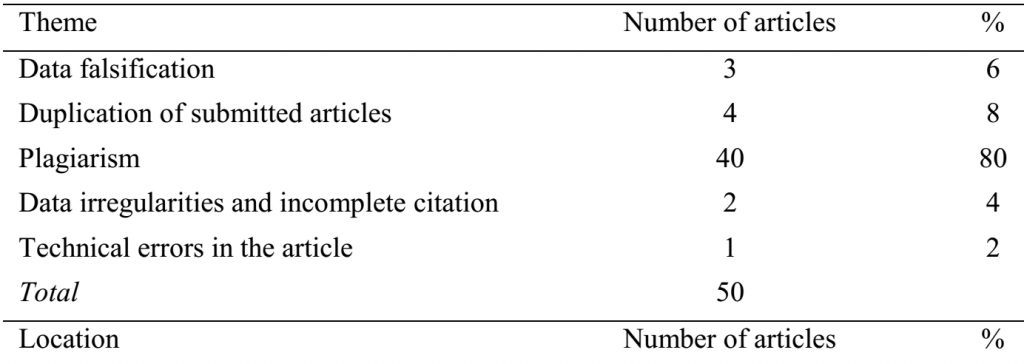
For example, one of the papers listed as having been retracted due to plagiarism is shown in Figure 4.

However, the corresponding retraction notice makes no mention of plagiarism, as shown in Figure 5.
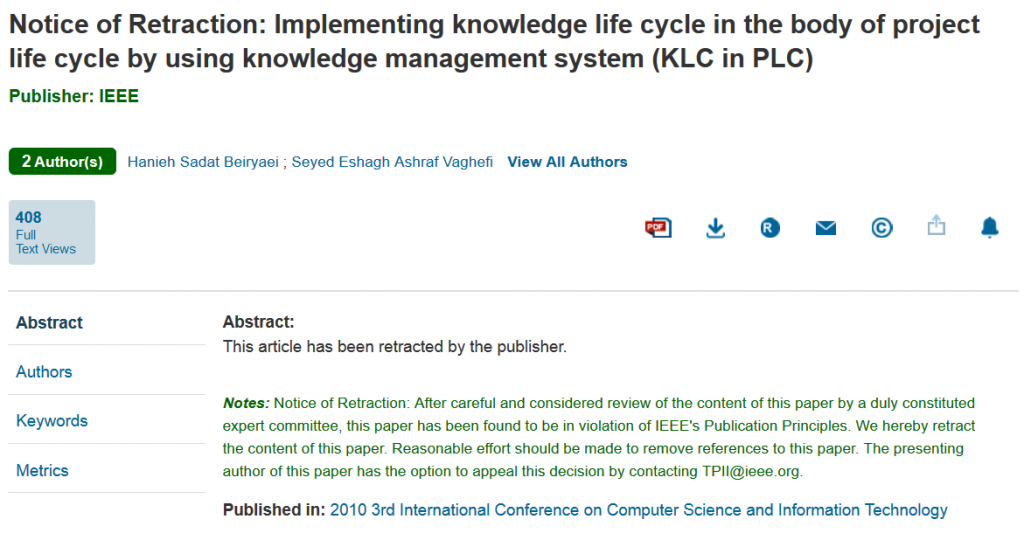
Further evidence for the conference paper authors having drawn an erroneous conclusion in this regard comes from Retraction Watch, which was unable to obtain a definitive answer from IEEE about why the retractions occurred.
Overlooking more serious issues
So is it correct for the conference paper “Promoting Ethics and Integrity in Management Academic Research: Retraction Initiative” to make the following statement?
Interestingly, the analyzed results indicate that knowledge management has the highest number of retracted articles with plagiarism as the predominant ethical issues.
The analysis above has shown the statement to be only partly accurate. An examination of the IEEE database has shown that the conclusion that “knowledge management has the highest number of retracted articles” is correct. However, the conference paper incorrectly states that the number of retracted knowledge management papers is far higher than for other fields. Further, the conclusion of “plagiarism as the predominant ethical issues” is apparently not supported by the evidence.
However, it’s not just the questionable conclusions that the paper authors have drawn in regard to knowledge management research that are of concern. Also troubling are the serious issues that they have apparently overlooked.
As discussed above, one issue identified by the authors but not followed up is that nearly all of the retracted papers were published by just one publisher – the Institute of Electrical and Electronic Engineers (IEEE), which is based in New York. But there’s also a second linked issue that the authors identified but didn’t follow up. The primary location of the retractions analysed in the paper “Promoting Ethics and Integrity in Management Academic Research: Retraction Initiative” is identified as China, as shown in Figure 6. This was confirmed through an IEEE Xplore search using the keywords “Notice of Retraction” China, which produced 9,032 results (compared to the total of 9,682 “Notice of Retraction” results as shown in Figure 2 above).
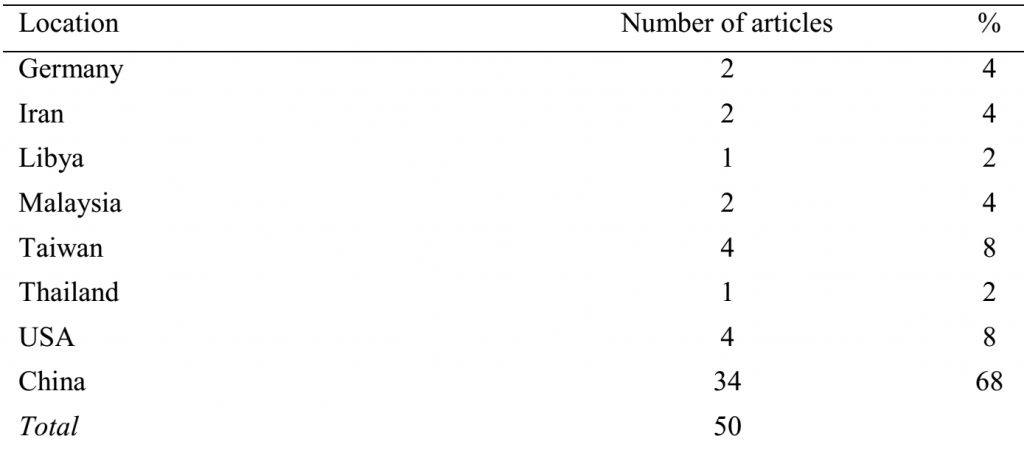
So the serious questions that remain unaddressed are:
- Why has one U.S.-based academic publisher, IEEE, had such a staggeringly high number of article retractions, most of which come from just one country – China?
- Why won’t IEEE openly discuss the reasons for the retractions?
Reference:
- Ayodele, F. O., Liu, Y., & Hasnah, H. (2017). Promoting Ethics and Integrity in Management Academic Research: Retraction Initiative. 1st Conference on Governance & Integrity, 2017 “Innovation & Sustainability Through Governance” 3–4 April 2017, Malaysia. ↩
Also published on Medium.







I think the opposite may be true: KM professionals may show a higher ethical bar because they actually retract articles. In the quality and risk management fields, the ranks are filled with “thought leaders” and standards body participants who are openly flouting all ethical norms. In one case, an ISO committee chair was discovered to have padded his resume by adding over 20 years of experience he didn’t have; he was previously the group’s “ethics expert,” and even after the padding was revealed, he was still rewarded with a Chair position. In another case, a risk management expert was found to have plagiarized entire articles — not snippets, ENTIRE articles, photos and all — and was then caught posing as a woman online to entice men to take his training classes. He, too, has been largely rewarded for his efforts in the field. Our “official” industry journals were found to be in violation of standard peer-review guidelines, rejecting articles that offered skeptical analysis of subjects, and granting special publishing rights to “friendly” authors who agreed to help sell products. In another case, a premier quality magazine was caught running articles by someone espousing white supremacist views, and then threatened to sue when readers tried to notify advertisers. There has never been, in my 30+ year career, an article retracted even as the authors of such articles engage in open ethically-challenged behavior. The run the show, so there’s nothing anyone can do about it.
Great follow up research Bruce. thanks for the article.